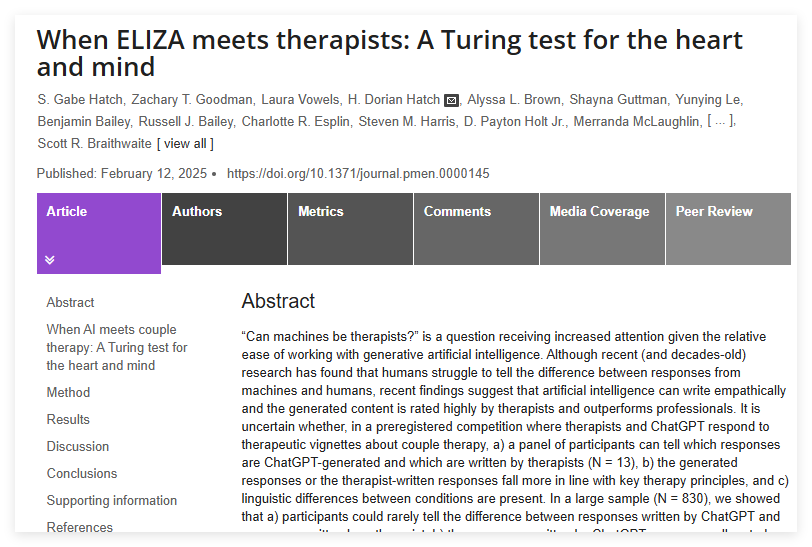A recent breakthrough study reveals the amazing potential of artificial intelligence in the field of psychotherapy. Through carefully designed experiments, the research team asked 830 participants to judge conversations in 18 couples treatment cases, trying to distinguish which responses were from ChatGPT and which were from experienced human therapists. This study not only provides a new perspective for the application of artificial intelligence in the field of mental health, but also triggers profound thinking on future psychotherapy models.

The results of the study were surprising: the participants had only slightly higher accuracy than random guesses when identifying the source of treatment response. The percentage of responses in human therapists were correctly identified was 56.1%, while the percentage of responses in ChatGPT was 51.2%. This data shows that artificial intelligence has reached a considerable level in simulating human therapists. More notably, ChatGPT outperforms human experts in multiple treatment quality dimensions, especially in establishing therapeutic alliances, showing empathy, and adapting to different cultural backgrounds.
There are many reasons why artificial intelligence has achieved such remarkable results in the field of psychotherapy. First, AI systems can provide more detailed and comprehensive answers, using richer vocabulary and more positive tone. Second, ChatGPT is able to process large amounts of information quickly and demonstrates deeper understanding and insight in responses. However, the study also found an interesting phenomenon: when participants knew they were reading the responses generated by AI, they often gave lower ratings; when they thought these responses were from human therapists, the ratings were significantly improved.
Despite the exciting results, the researchers also pointed out their limitations. These experiments were performed in brief hypothetical treatment scenarios rather than real treatment processes. In addition, researchers question whether these findings can be generalized to more complex treatment situations such as individual consultation. These issues point out the direction for future research and remind us that we need to be cautious about the application of AI in the field of psychotherapy.
As evidence of the potential of AI in the therapeutic field is increasing, researchers stress that mental health professionals need to have a deeper understanding of these systems. They called on clinical workers to actively participate in the training and monitoring of AI models to ensure that these technologies can provide high standards of care. At the same time, it is also necessary to establish corresponding ethical standards and regulatory mechanisms to protect the rights and interests of patients.
It is worth noting that ChatGPT's excellent performance in the field of psychotherapy is not an isolated case. Research from the University of Melbourne and the University of Western Australia shows that ChatGPT provides advice that is more balanced, comprehensive and empathetic than human columnists when dealing with social dilemmas. However, despite the outstanding performance of AI, most participants still tend to choose human consultants. In the Australian study, 77% of respondents said they were more willing to accept human advice.
Although AI responses in medical diagnosis and psychotherapy are considered to be more empathetic and quality, researchers remain cautious. Researchers at Stanford and the University of Texas pointed out that large language models lack real "theory of mind" and cannot experience true empathy. They called for the establishment of international research projects to develop guidelines for the safe integration of AI in psychology to ensure that the application of these technologies is both effective and safe.
This study not only demonstrates the potential of AI in the field of psychotherapy, but also triggers in-depth thinking on future treatment models. With the continuous advancement of technology, AI may become an important supplement to mental health services, but the unique value and irreplaceability of human therapists still need to be valued. The future development direction may be a human-computer collaboration treatment model, giving full play to the advantages of AI and humans, and providing patients with better mental health services.